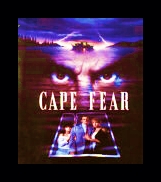|
|
PABST BLUE
RIBBON
Robert
Mitchum’s ability to go from unrepentant menace in The Night of the
Hunter and Cape
Fear to attractive
protector to Marilyn in River of No Return and Deborah Kerr
in Heaven Knows, Mr. Allison, to husband-lover-father in
The Sundowners to imperturbably stoic Pug in The Winds
of War and
War and
Remembrance,
represented more than just an actor who admitted he’d play anything
just for the money; the roles denote attitudes of masculinity. In looking
him over, it somehow seems right he was arrested for grass possession
because he typified disdain for obedience; he was a living example of pulp
fiction. And it also seems to make perfect sense he was a rugged solider
in war movies, a sleepy-eyed cad or an extremely nonchalant dick in film
noir: he was so contemporarily American he was like a Pabst Blue Ribbon
poster boy—a paunchy belter of booze, broads and baddies. (And it’s why,
despite what some fans and critics argue otherwise, he was out of his comfort zone in westerns.)
Mitchum always wanted to be a better actor than the slugged icon of contempt
he freely embellished. John Huston sought out Mitchum’s genuine
“air of
casualness, his lack of
pomposity”
for Heaven Knows, in which the actor (and the audience) discovered
his cragginess would find its match in Deborah Kerr’s refinery. Opposites,
of course, are sexual magnets, and if Mitchum can only dare to dream about
what’s underneath Kerr’s religious habit, he’s given the chance to do much
more in Fred Zinnemann’s The Sundowners. (There’s no doubting
they ripped a few tent cots; they do it more demurely in The Grass
is Greener.) A short time later Mitchum would exhibit the effectiveness
of being a startlingly cool hazard in J. Lee Thompson’s
Cape
Fear. When Mitchum says to Gregory Peck
about his daughter,
“She’s getting to be
as juicy as your
wife,”
we applaud the benefits of 1962 language constraints; when he’s going
after Polly Bergen, we appreciate the dearth of explicit sexual violence,
though, as Bergen recounted years later, the scene was so intense that when
the director yelled
“cut,” she and Mitchum continued
and had to be physically separated. Imagine what we’d have lost had he succeeded in dissuading the moviemakers from using him.
 Is there any way to explain Martin Scorsese’s clumsy remake
of the 1962 thriller Cape
Fear other than to suspect he’s phoning
in his direction? What else accounts for the total lack of fear? Though there’s
one wower of a moment when beastie Robert De Niro takes a bite out of a victim,
overall this bummer has no snap, crackle or pop. And no comedy: Scorsese’s
use of original stars Robert (De Niro) Mitchum and Gregory (Nick Nolte) Peck
is meant to be a fun skewing on justice, but Mitchum is only half awake to
the mock and Peck’s cameo is destroyed by a foolish advancing of what’s coming.
There are other flagrant disregards to surprises, and the editing and the
in and out zoom shots of doorknobs and window shutters reinforce the notion
Scorsese’s snoozily swerving in the phone booth. How Robert De Niro won
an Oscar nod for this over-the-topper is one of trivia’s great unanswerables;
it might have to do with violence being “in” during the
Silence of the Lambs season—20 nods in the top 6 categories
were for movies in one way or another dealing with horror. No one wants to
hear more complaints about such excesses but in a kick in my own rear, I’d
say what’s the matter with De Niro is he’s not as vio-scary as he should
be. There’s a pansiness in the script: no one who matters is violated. (In
fact, you’re desperately happy to see those who do get it finally get it.)
De Niro fractures into hints of Travis Bickle and an educated Norman
Bates, but unlike his work in The King of Comedy, necessitating
a six pack of Raid to rid yourself of a case of the creeps, he’s got a few
redeeming bits, and he’s in fantastic shape. At his ugliest, there’s something
sickie-attractive about the repulsiveness—he’s every masochist’s dream
of a sex monster. As the family De Niro preys on, Nick Nolte, Jessica Lange
and Juliette Lewis couldn’t be more ambivalent; they’re practically begging
for entry into the Bates School of Victims. Via conference calling, Nolte
and Lange are merely serviceable, but Lewis, a Lolita-ish Linda Blair, refreshes
the hackneyed vulnerable teenager of countless screamers and steals a
much-too-long college theatre sequence with De Niro (during which he seems to be replaying
his devil from Angel Heart). Lewis, however, opens and closes
the film with totally unnecessary narration coming off sounding like
Mad Max fatalism. Even the re-working by Elmer Bernstein of
Bernard Herrmann’s original score has been Maxed out. But the
audience I saw the movie with had some fun anyway: as De Niro kept rising from the dead, a few young
redneckers yelled, “It’s Jason!” and when Joe Don Baker pours a
Jim Beam mixed with liquid Pepto Bismol, another cracked, “Hey, fix
one for us, too!” Is there any way to explain Martin Scorsese’s clumsy remake
of the 1962 thriller Cape
Fear other than to suspect he’s phoning
in his direction? What else accounts for the total lack of fear? Though there’s
one wower of a moment when beastie Robert De Niro takes a bite out of a victim,
overall this bummer has no snap, crackle or pop. And no comedy: Scorsese’s
use of original stars Robert (De Niro) Mitchum and Gregory (Nick Nolte) Peck
is meant to be a fun skewing on justice, but Mitchum is only half awake to
the mock and Peck’s cameo is destroyed by a foolish advancing of what’s coming.
There are other flagrant disregards to surprises, and the editing and the
in and out zoom shots of doorknobs and window shutters reinforce the notion
Scorsese’s snoozily swerving in the phone booth. How Robert De Niro won
an Oscar nod for this over-the-topper is one of trivia’s great unanswerables;
it might have to do with violence being “in” during the
Silence of the Lambs season—20 nods in the top 6 categories
were for movies in one way or another dealing with horror. No one wants to
hear more complaints about such excesses but in a kick in my own rear, I’d
say what’s the matter with De Niro is he’s not as vio-scary as he should
be. There’s a pansiness in the script: no one who matters is violated. (In
fact, you’re desperately happy to see those who do get it finally get it.)
De Niro fractures into hints of Travis Bickle and an educated Norman
Bates, but unlike his work in The King of Comedy, necessitating
a six pack of Raid to rid yourself of a case of the creeps, he’s got a few
redeeming bits, and he’s in fantastic shape. At his ugliest, there’s something
sickie-attractive about the repulsiveness—he’s every masochist’s dream
of a sex monster. As the family De Niro preys on, Nick Nolte, Jessica Lange
and Juliette Lewis couldn’t be more ambivalent; they’re practically begging
for entry into the Bates School of Victims. Via conference calling, Nolte
and Lange are merely serviceable, but Lewis, a Lolita-ish Linda Blair, refreshes
the hackneyed vulnerable teenager of countless screamers and steals a
much-too-long college theatre sequence with De Niro (during which he seems to be replaying
his devil from Angel Heart). Lewis, however, opens and closes
the film with totally unnecessary narration coming off sounding like
Mad Max fatalism. Even the re-working by Elmer Bernstein of
Bernard Herrmann’s original score has been Maxed out. But the
audience I saw the movie with had some fun anyway: as De Niro kept rising from the dead, a few young
redneckers yelled, “It’s Jason!” and when Joe Don Baker pours a
Jim Beam mixed with liquid Pepto Bismol, another cracked, “Hey, fix
one for us, too!”
BACK
NEXT
HOME
ralphbenner@nowreviewing.com
Text COPYRIGHT © 2005 RALPH BENNER All
Rights Reserved.
|

